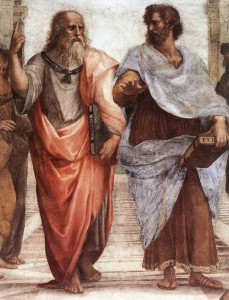 A couple of weeks ago, I had the pleasure of attending an excellent teacher workshop presentation by Mr. Vlahogiannis, one of our senior academic department heads. For many years Mr. Vlahogiannis has led the social science department and throughout his 20+ years at LCC, he has taught philosophy.
A couple of weeks ago, I had the pleasure of attending an excellent teacher workshop presentation by Mr. Vlahogiannis, one of our senior academic department heads. For many years Mr. Vlahogiannis has led the social science department and throughout his 20+ years at LCC, he has taught philosophy.
His presentation to teachers was a window into philosophy, the subject he calls the “subversive discipline”. Why subversive? Essentially because philosophy is a discipline that promotes rational thought and constant questioning. The questioning focuses on norms in our society, our pervasive ideology, and the nature of beauty, virtue, goodness, and ethics. Through disciplined questioning we can determine a better understanding of so much around us.
Many modern philosophers claim that today’s youth are more consumers than citizens; that they’ve been trained to want to consume, so it is hard for them to understand the more important complexities of citizenship and its responsibilities. These philosophers assert that young people are mixed up about how, why, and where they can contribute to the “public good” in meaningful ways.
As young people watch hundreds (actually thousands) of digital and TV commercials that promote or portray a so-called “good-life”, philosophers are concerned that it is becoming increasingly difficult to define the “good life” beyond the powerful allure of consumerism—owning stuff, more and more stuff. There are strong pressures from corporate interests for youth to define themselves with “things” rather than character and their possible contributions to a healthy society.
So to make some inroads on these important questions, I simply suggest our senior students register for Mr. Vlahogiannis’ classes. There they will be given the opportunity to ask many questions, explore the history and foundations of philosophy, discuss concrete issues, and participate in case studies.
That said, some of the first and most famous philosophers were the ancient Greeks. They were very interested in the nature of existence and they were the first to be able to distinguish the capacity of human beings for rational thought, decision-making and reason.
That legacy has had a massive impact over the past 2000 years or so. I recently ran across a book by two philosophers entitled Ten Golden Rules of Leadership: Classical Wisdom for Modern Leaders by Michael Soupios and Panos Mourdoukoutas. They have reviewed the writings of the classical philosophers and selected ten ideas that positively impact the effectiveness of leaders and remain relevant today. The authors remind us that genuine leadership is very demanding and requires courage, principles and practice. That’s something I believe all our students need to learn as we offer them different opportunities to lead and refine their skills.
Genuine leadership is difficult because in addition to simply getting things done, it actually requires leaders do the inner-work on a continual basis. And that is a lot to commit to; it’s lifelong.
So, from classical Greek philosophy, here are 10 timeless classic rules for leadership:
- Rule 1: “Know Thyself.” – Thales
- Rule 2: “Office Shows the Person.” – Pittacus
- Rule 3: “Nurture Community at the Workplace.” – Plato
- Rule 4: “Do Not Waste Energy on Things You Cannot Change.” – Aristophanes
- Rule 5: “Always Embrace the Truth.” – Antisthenes
- Rule 6: “Let Competition Reveal Talent.” – Hesiod
- Rule 7: “Live Life by a Higher Code.” – Aristotle
- Rule 8: “Always Evaluate Information with a Critical Eye.” – The Skeptics
- Rule 9: “Never Underestimate the Power of Personal Integrity.” – Sophocles
- Rule 10: “Character Is Destiny.” – Heraclitus
— Christopher Shannon, Headmaster
